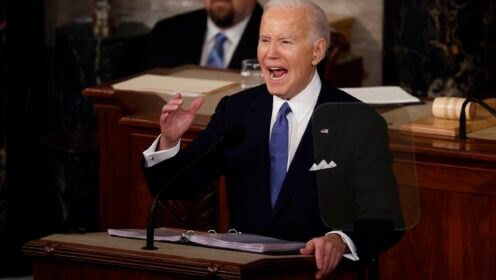by Thaddeus G. McCotter
For the State of the Union address, political strategy would suggest to Mr. Biden that he at least try to rise above the fray and appear more like a statesman than a stump speaker. It was not to be.

In a country deeply estranged along party lines, President Joe Biden’s recent State of the Union constituted a partisan diatribe, not a unifying address. This was not solely the result of Mr. Biden’s personal frailties and biases. There was a method to his mendacity and its delivery.
Customarily, the modern SOTU is addressed to Congress, of course, and to the entirety of the American people. Presidents being politicians and leaders of their parties, partisanship is not unheard of, though it is often brief and subtle. The reason is that Americans, while knowing presidents are politicians, want to know their head of state can rise above partisanship when the need arises and put the interests of the country ahead of party.
Obviously, during a re-election year, the president will be sorely tempted to be more partisan than usual. No stranger to decrying millions of his fellow citizens as dangerous threats to the nation (which he conflates with his party), it is easy to chalk Mr. Biden’s excremental oratorical ejaculations as simply par for the course. Yet, given his partisan bona fides, political strategy would suggest to Mr. Biden that he at least try to rise above the fray and appear more like a statesman than a stump speaker.
It was not to be, and for a dispositive political reason: most Americans are concerned Mr. Biden’s manifestations of his age preclude him from being an effective president; and, more importantly, in the near term, most of his own party pines for a more hale and hearty standard bearer. Consequently, the Biden team played into their man’s strengths, such as they are, and what followed was less an address than a paranoiac’s animadversions against his opponents.Having already met with social media influencers to prime the pump and knowing the supine regime media would ever be on board for some GOP/MAGA bashing, the SOTU reviews were a forgone conclusion: “a ‘fiery’ Biden calls out,” ad nauseum…. As designed, the less than presidential polemic played well with its target audience of Democrats, though whether it will quell the base’s desire for a better presidential nominee remains to be seen, or, crucially, if it remains and is unmet, whether the fear of Mr. Trump will spur a sufficient voter turnout during the election’s voting period (“election day” being rendered quaint).
Still, Mr. Biden whispered, whelped, and threatened to the heavens, and, after comparing our current state of the union with America on the precipice of World War II (and, less than subtly, himself to FDR), tossed in the Civil War to boot in uttering these nationally divisive low-lights for the ages:
Not since President Lincoln and the Civil War have freedom and democracy been under assault here at home as they are today. What makes our moment rare is that freedom and democracy are under attack, both at home and overseas, at the very same time…
“January 6th and the lies about the 2020 election, and the plots to steal the election, posed the gravest threat to our democracy since the Civil War.
Uh, yeah….
Not wanting to minimize the horrors of World War II or the Civil War, let us look to the historical record to see how two presidents, one an incumbent Democrat and the other a former Republican president and general, worked together to further heal a nation that only recently emerged from an internecine cauldron of death and destruction.On July 23, 1885, former Lieutenant General of all the Union Armies and, later, President Ulysses S. Grant died of throat cancer. President Grover Cleveland, a Democrat, ordered a national period of mourning for thirty days. He also ensured that his Republican predecessor Grant’s last requests regarding the funeral were honored. President Cleveland did so.
After a train had taken Grant’s body to New York City, a seven-mile-long funeral march ensued, with tens of thousands of mourners—including President Cleveland and former Presidents Hayes and Arthur—following behind the two dozen black stallions drawing the casket to Riverside Park. Reportedly, over a million and a half people viewed the funeral.
Per Grant’s wishes, President Cleveland assigned these men as pall bearers: Generals William Tecumseh Sherman, Philip Sheridan, Simon Bolivar Buckner, and Joseph Johnston. They rode together in the same carriage. Sherman and Sheridan fought for the Union. Buckner and Johnston fought for the Confederacy.
As a result, the entire country was able to witness and, like President Cleveland, honor the last act of a dying President Grant, a man whose job entailed killing his fellow Americans who were trying to kill him, namely, empathy and forgiveness in the cause of healing, peace, and unity.
Thus, in this tale of three presidents, Americans should be grateful that Presidents Grant and Cleveland (and Hayes and Arthur, as well), and Generals Sherman, Sheridan, Buckner, and Johnston rose above parochial and personal concerns and performed such a magnanimous and commendable act on behalf of uniting a reconstructing, though still Civil War-scarred, nation.
As for the divisive Mr. Biden?
Well, sometimes a distressed body politic drops a deuce, like a Buchanan, before a Lincoln comes along to clean up the mess.
An American Greatness contributor, the Hon. Thaddeus G. McCotter (M.C., Ret.) served Michigan’s 11th Congressional district from 2003-2012, and served as Chair of the Republican House Policy Committee. Not a lobbyist, he is a frequent public speaker and moderator for public policy seminars; and a Monday co-host of the “John Batchelor Radio Show,” among sundry media appearances.
Thaddeus G. McCotter
Source: https://amgreatness.com/2024/03/23/unity-a-tale-of-three-presidents/
No comments:
Post a Comment